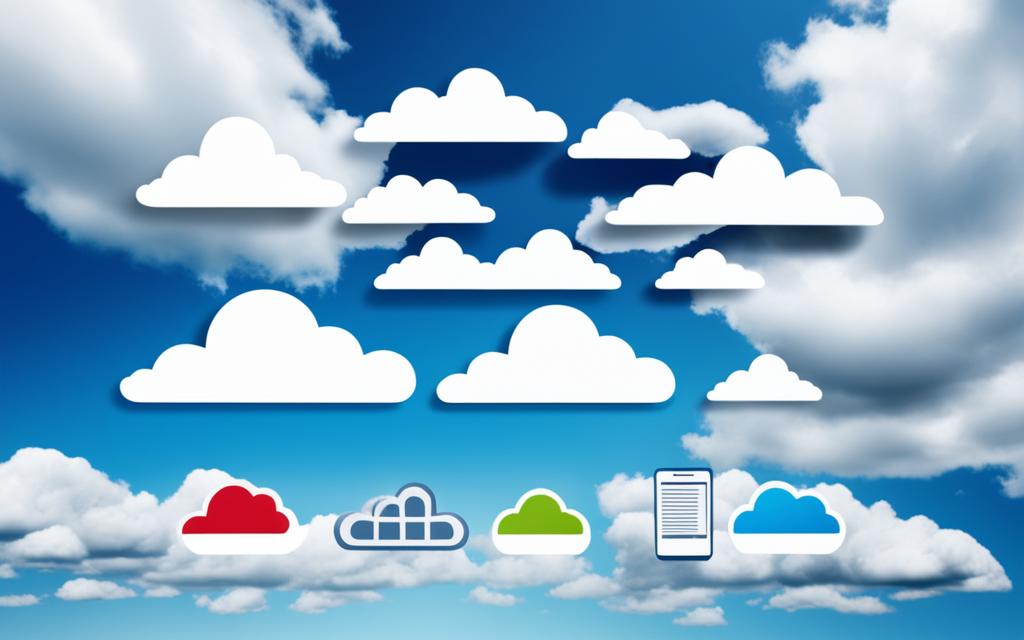Table of Contents
In today’s digital world, it’s key to know the difference between cloud computing and cloud storage. Both use the internet’s power, but for different needs. Cloud computing lets us perform complex tasks online without heavy local resources. On the other hand, cloud storage gives us space to keep our data online. This makes it easy to access and share our files from anywhere. Over recent years, using these cloud services has grown a lot. They are now essential in many industries1. This piece will explore both concepts, looking at what sets them apart, their main uses, and how they benefit us.
Knowing these differences helps companies use both cloud computing and storage better. They aim to mix these technologies. This boosts efficiency and cuts costs.
Key Takeaways
- Cloud computing delivers processing power and applications over the internet, while cloud storage focuses on data storage.
- Both technologies significantly contribute to the modern digital infrastructure, offering scalability and flexibility.
- Common cloud storage services like Google Drive and Dropbox enable global access to files1.
- Understanding the unique applications of each can help businesses choose the right solutions for their needs.
- The increased reliance on cloud services influences data management strategies across various industries1.
- Combining cloud computing and storage can enhance efficiency and lower operational costs2.
- Evaluating the security features of cloud services is vital to maintaining data integrity and compliance3.
Understanding Cloud Computing
Cloud computing changes the way businesses work in today’s digital world. It offers internet-based services like shared resources to improve efficiency and save money. Learning what it means is key to using the important features of cloud solutions.
Definition and Key Features
Cloud computing includes services such as storage, computing power, and software as a service (SaaS). Its main features are:
- On-demand access to shared resources
- Scalability to meet changing needs
- Flexibility for access from different places
Companies don’t need to make big investments in infrastructure. They gain flexibility and efficiency quickly. Public cloud services spending is expected to reach USD 679 billion and could surpass USD 1 trillion by 20274.
Common Applications of Cloud Computing
Cloud computing is very versatile. It supports everything from basic email like Gmail and Microsoft Office 365 to advanced data analysis and machine learning. It’s used in various ways across industries, including:
- Online data analytics for better decisions
- Website hosting to increase efficiency
- Application development for easier software updates
Netflix is a great example of cloud computing in action. It uses the cloud to store vast amounts of data for streaming and gaining insights about users. As cloud technology evolves, hybrid options are being developed. These options meet diverse business needs, boost operational flexibility5, and help with security issues that come with cloud use6.
Understanding Cloud Storage
Cloud storage is changing how we handle data, with its services offered over the internet. It brings big benefits, like better access and stronger data security. By keeping data on remote servers, organizations cut down the dangers linked to physical storage and make it easier to get the data back when needed.
Definition and Key Features
Cloud storage does more than just hold onto your data. It includes important functions like automatic backups and making sure data is duplicated for safety. A standout fact is that it’s both low-cost and highly reliable for storing huge amounts of data, especially for backups and when you need to recover from disasters7. This flexibility is especially useful for businesses handling lots of unstructured data and needing long-term storage solutions.
Popular Cloud Storage Services
Names like Google Drive, iCloud, and Dropbox are big in cloud storage. They’re made for both regular people and companies, making it easy to upload, store, and handle files without worrying about physical storage space. Each offers special features, such as top-notch security and tools for working together, making them more accessible for users.
Benefits of Using Cloud Storage
The advantages of cloud storage are hard to ignore. It offers better security for data and eases disaster recovery processes. With data stored in the cloud, companies are protected against local issues like fires or floods. Plus, it allows many users to work on files together from different places, showcasing one of its best benefits.
Cloud storage also uses a pay-as-you-go pricing, helping organizations save money. They only pay for the storage they need, while also meeting global regulations8. This means companies can focus more on their main work, enjoying better data handling78.
The Relationship Between Cloud Computing and Cloud Storage
Cloud computing and storage are not just trendy words. They represent a strong link that boosts efficiency for people and businesses. The cloud computing and storage relationship is key. Cloud storage acts as the backbone for cloud computing to work. As they grow, they bring new chances for innovative integrated solutions useful in many situations.
How They Interact and Complement Each Other
Cloud computing and cloud storage work together smoothly. Cloud computing uses cloud storage to hold applications and manage data. This allows users to get to their information from anywhere, safely. Companies like Amazon Web Services and Microsoft Azure show how cloud computing boosts cloud tech by offering storage that grows or shrinks as needed. Cloud storage, in turn, gets better at handling and fetching data, making sure it’s always there when needed.
Use Cases That Combine Both Technologies
There are many examples of how these technologies merge to improve effectiveness. Take Software-as-a-Service (SaaS) models like Adobe Creative Cloud. They mix cloud computing with storage, allowing access to great tools and safe file storage all in one place. Also, Virtual Desktop Infrastructure (VDI) uses both to let employees work from anywhere. They access apps and files through the cloud. This blend not only makes work flow better but also meets the changing needs of today’s companies.
Cloud Computing vs Cloud Storage: Key Differences
Cloud computing and cloud storage are often mixed up, but they have unique roles. Knowing the differences helps users use technology better. This knowledge is key in today’s tech world.
Data Handling and Processing
Cloud computing is all about processing data. It handles powerful applications and databases. This lets organisations do complex tasks from afar, making work more efficient. On the other hand, cloud storage deals with keeping data safe. Users can store and access files anywhere, which helps teams work together better9. Using both cloud computing and storage gives the best of both worlds. This blend improves how data is managed9.
Accessibility and Usage
What sets cloud computing apart from storage is how you can get to your apps. It makes using applications easy from anywhere. Cloud computing provides tools for difficult tasks. Cloud storage, though, makes sharing and working on files simple. Teams can work together easily. Public cloud storage is known for being flexible and affordable. Hybrid options add extra security10. Choosing the right cloud service is vital for success.
Cost Considerations
The costs of cloud computing and storage are different. Storage usually has a fixed price based on the amount of space you use. But, computing costs depend on how much resources you use10. This affects how businesses plan their budgets. Cloud storage can be cheaper than local options, saving on upkeep and growth11. Looking at these costs helps businesses decide what’s best for them.
Benefits of Cloud Computing
Cloud computing offers big benefits, boosting businesses’ efficiency. Key advantages include improved flexibility and cost savings. By delving into these points, we see the big impact on modern businesses.
Enhanced Mobility and Scalability
Cloud computing elevates mobility. It lets users access apps and data anywhere with an internet link. This suits today’s remote work trend perfectly. Plus, businesses can scale up or down easily without big upfront costs. This agility helps them keep up with fast changes, showing the real power of cloud benefits.
Such flexibility results in better operations, critical in today’s fast-tech world.
Cost Efficiency and Management
Cloud computing slashes costs by cutting out the need for onsite hardware. Firms save money and can focus on growth projects. They rely less on physical devices and more on cloud benefits. Service providers handle hefty tasks like updates and security. This means companies can concentrate on their key tasks, making everything more efficient.
Speed of Deployment and Upgrades
Cloud computing deploys fast, giving firms an edge. With services like Microsoft Azure and Amazon Web Services, companies get quick software upgrades. They set up apps fast and keep improving through updates. This helps businesses stay agile and meet new market needs, highlighting cloud tech’s swift benefits.
Benefits of Cloud Storage
Cloud storage brings fantastic benefits, especially when talking about data security and teamwork. It uses remote servers to boost data safety and set up strong systems for disaster recovery.
Improved Data Housing Security and Backup
Cloud storage security and data protection are top priorities for firms with 60% of global corporate data in the cloud12. Redundant servers keep data safe, preventing loss from hardware issues or disasters. Cloud services offer full back-up and disaster recovery options for quick data retrieval13. Plus, most use strong encryption to keep information secret and safe from hacks14.
Efficient Team Work Options
Platforms like Google Drive and Dropbox are great for sharing and team performance13. They let team members work together well, even if they are far apart. These systems give the power to scale up as needed, ensuring smooth project management and ongoing work flow12.
Conclusion
When we look at cloud computing and cloud storage, we see they offer special benefits for modern businesses. Understanding the difference between computing and storage is key to using technology well. As businesses go digital, using both can make them more efficient and spark new ideas.
It seems likely that future cloud tech will blend computing and storage even more. This could make data easier to handle and use. This combo also meets the need for more adaptable and growing solutions. Keeping an eye on these changes is smart for businesses wanting to stay ahead.
Knowing what cloud computing can and can’t do is vital for smart decisions. As companies use the cloud, storage will become a big part of their plans. This sets the stage for a future where data is both easy to get to and safe. Embracing these new tech ideas will help businesses grow and work better in today’s quick market1516.
FAQ
What is the main difference between cloud computing and cloud storage?
Cloud computing deals with data processing and hosting applications. Meanwhile, cloud storage focuses on keeping and getting data safely.
How does cloud computing benefit businesses?
Cloud computing boosts mobility and scalability. It lets businesses use apps from anywhere, adjust resources on demand, and cut down on infrastructure costs.
What are the benefits of using cloud storage?
Cloud storage brings better data security, automatic backups, easy access, and tools for teamwork. This makes working together from different places smooth.
Can cloud storage and cloud computing work together?
A: Yes, cloud storage and cloud computing complement each other. Cloud storage handles data storing, while cloud computing processes this data. This duo boosts efficiency.
What are some popular cloud storage services available?
Popular services like Google Drive, Dropbox, and Microsoft OneDrive offer file sharing, teamwork tools, and solid security. Each has unique features.
How do pricing models differ between cloud computing and cloud storage?
Cloud storage uses a subscription model based on used storage space. Cloud computing’s costs depend on resource use, like timeframe and data movement.
What features should I look for in cloud services?
Look for features like data security, easy access, performance, and integration ease with tools. Also, ensure it meets your business needs well.
How does cloud storage contribute to disaster recovery?
Cloud storage plays a key role in disaster recovery. It keeps data safely offsite, reducing data loss risk from local disasters. This ensures quick data recovery when necessary.
Source Links
- https://www.purestorage.com/br/knowledge/cloud-computing-vs-cloud-storage.html – Cloud Computing vs. Cloud Storage | Pure Storage
- https://www.carbonite.com/blog/2019/cloud-storage-vs.-cloud-backup-whats-the-difference – Cloud storage vs. cloud backup: What’s the difference? | Carbonite
- https://cloud.google.com/learn/what-is-cloud-storage – What is Cloud Storage?
- https://www.ibm.com/topics/cloud-computing – What Is Cloud Computing? | IBM
- https://www.cleo.com/blog/knowledge-base-on-premise-vs-cloud – On Premise vs. Cloud: Key Differences, Benefits and Risks
- https://www.zdnet.com/article/what-is-cloud-computing-everything-you-need-to-know-about-the-cloud/ – What is cloud computing? Everything you need to know about the cloud explained
- https://aws.amazon.com/what-is/cloud-storage/ – What is Cloud Storage? – Cloud Storage Explained – AWS
- https://www.symmetry.com/payroll-tax-insights/understanding-cloud-based-vs.-local-network-data-storage – Understanding Cloud-based vs. Local/Network Data Storage
- https://stackoverflow.com/questions/58168049/what-is-the-different-between-cloud-storage-and-cloud-computing – What is the different between Cloud storage and cloud computing?
- https://technologyadvice.com/blog/information-technology/cloud-storage-vs-local-storage/ – Cloud Storage vs. Local Storage: 5 Things to Know in 2023
- https://www.redswitches.com/blog/cloud-storage-vs-local-storage/ – Cloud Storage Vs. Local Storage: 13 Key Differences
- https://www.qa.com/resources/blog/10-benefits-of-using-cloud-storage/ – qa.com | 10 benefits of using cloud storages
- https://www.knowledgehut.com/blog/cloud-computing/cloud-computing-vs-cloud-storage – Cloud Computing vs Cloud Storage: Key Comparison
- https://www.securestorageservices.co.uk/article/11/pros-and-cons-of-cloud-storage – Pros and Cons of Cloud Storage
- https://cloud.folio3.com/blog/cloud-computing-vs-traditional-computing/ – How To Choose Between Cloud Computing vs Traditional Computing For Your Business
- https://www.sciencedirect.com/topics/computer-science/cloud-storage – Cloud Storage – an overview








